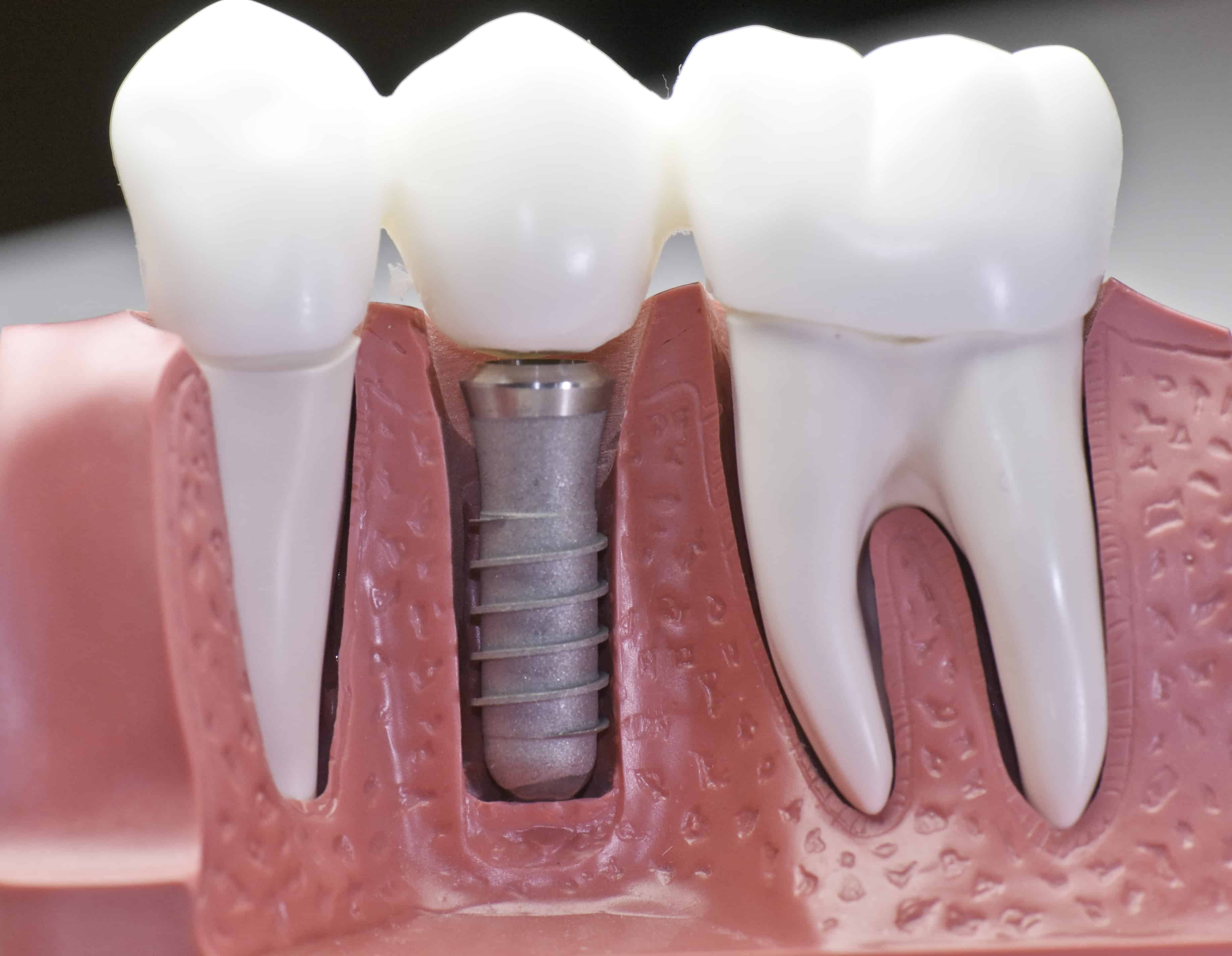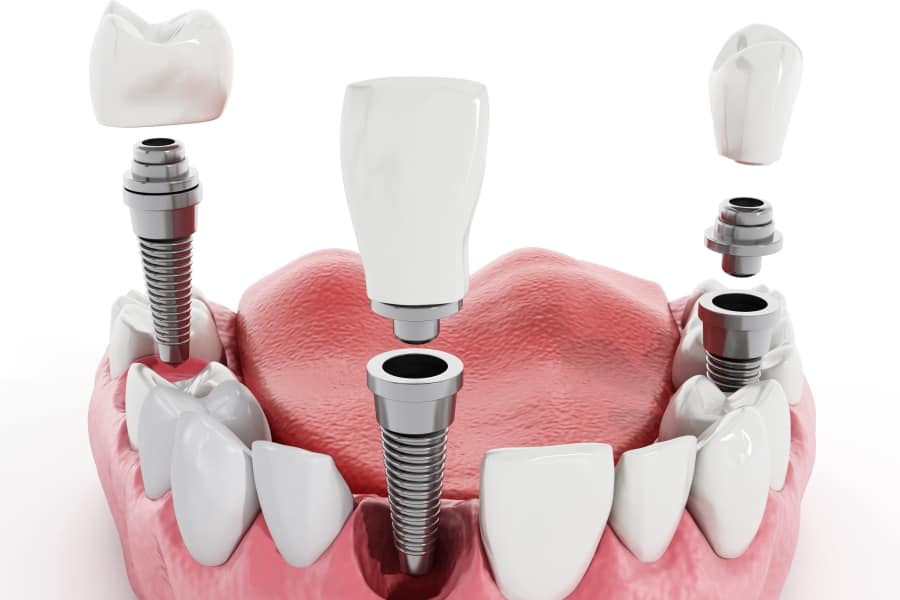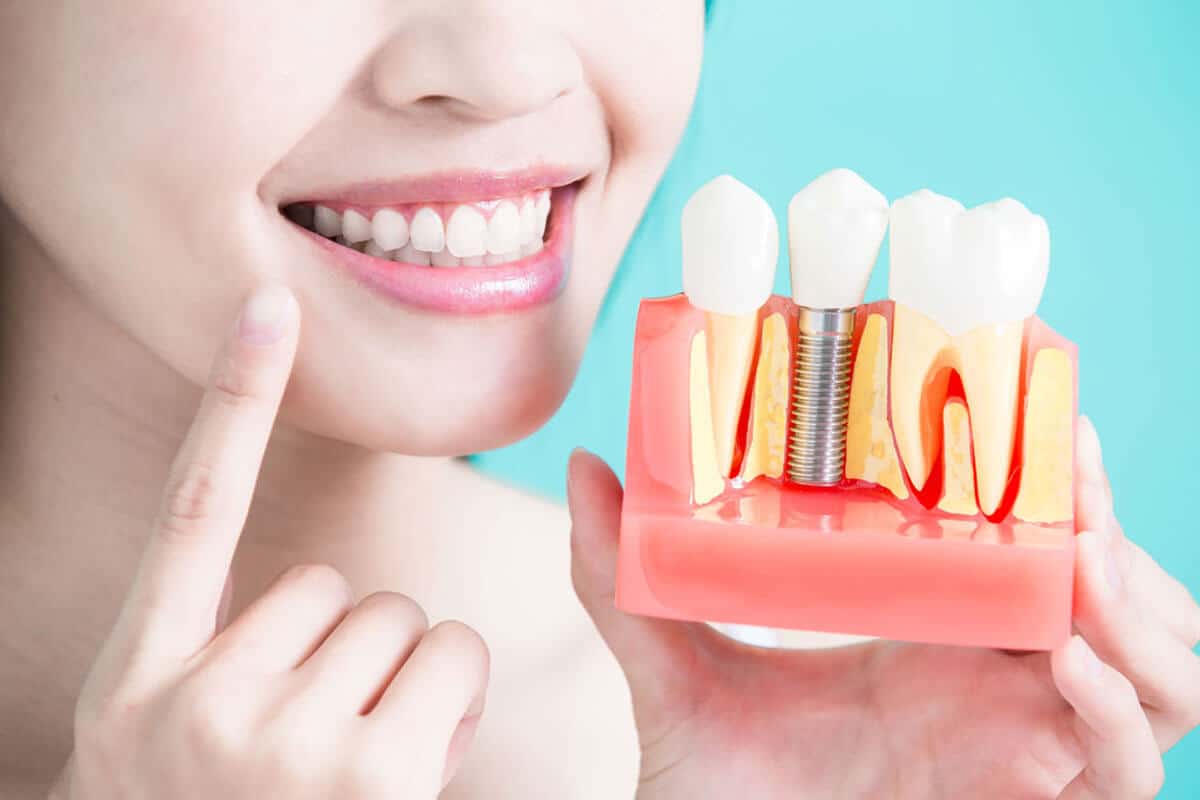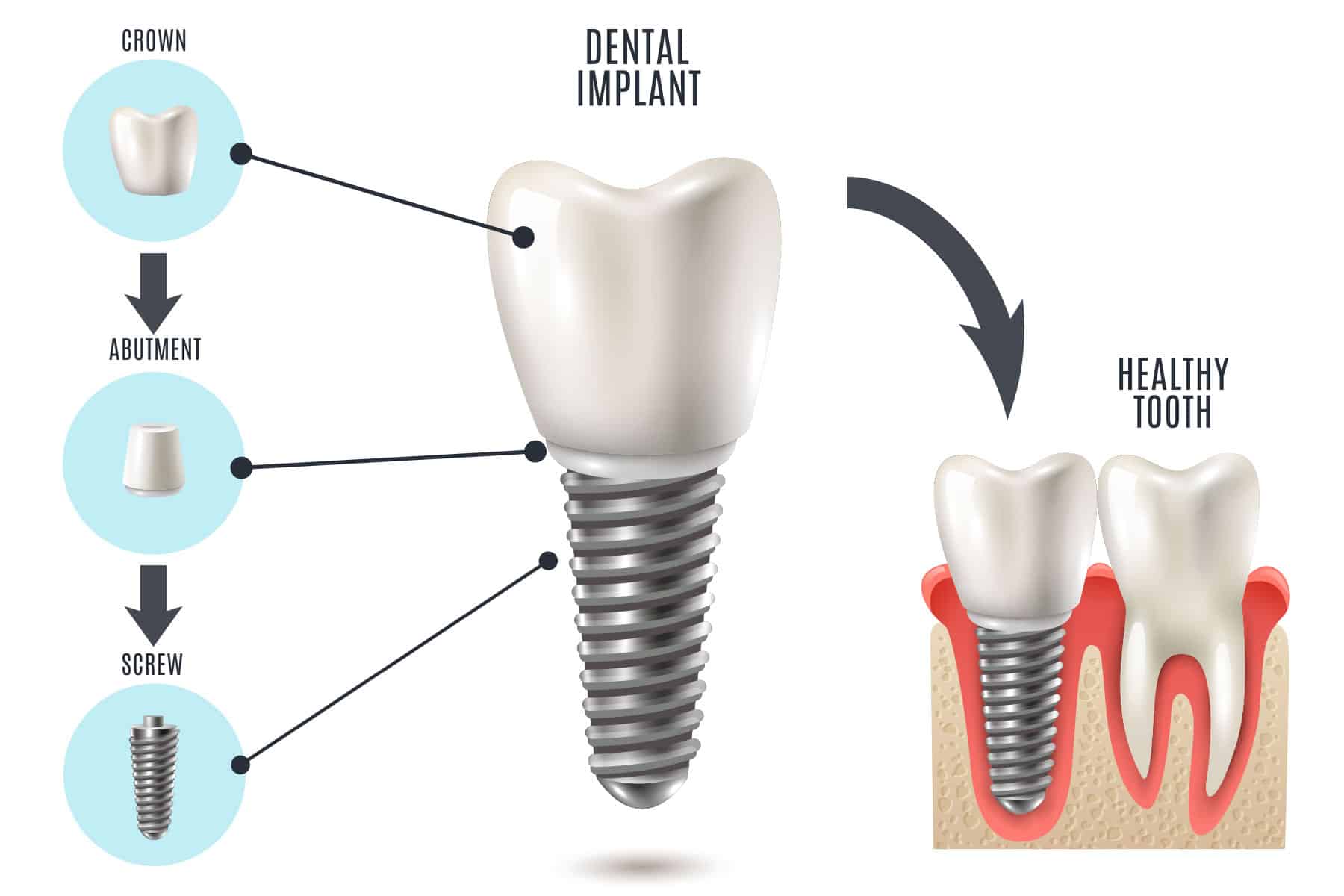What are Dental Implants?
This page is intended to answer 7 of the most common questions you may have regarding dental implants.
Answers to 7 Commonly Asked Questions
What are dental implants? Los Angeles Dental Implants are basically sophisticated screws made of a medically pure metal, Titanium. These screws are then placed in the jaw bone and rest under the gum for 3 – 6 months. During this time they actually fuse to the jawbone and become osseo(bone)integrated. After the appropriate healing time, we uncover the implants and use them to replace one or more missing teeth by fabricating some sort of dental prosthesis.
The Gold Standard of Dental Implants
Implant Types
- How long have implants been used in dentistry? Dental implants have been available for the past 50 or so years. There are significant differences, however, between the various types of implants that have been used to replace missing teeth. These differences are important since they are directly related to the implants success rates. The implants currently in use today, OSSEOINTEGRATED IMPLANTS, were originally developed in Sweden by Dr. P.I. Branemark., a Swedish Orthopedist approximately 25-30 years ago. They have been used in the U.S. for the past 12 years.
- I understand they originated in Sweden? Is there a difference between the different implant manufacturers? All implants in use in the United States are regulated by the Food and Drug Administration. Originally, the only system available was the Noblepharma™ Branemark implant. Today, there are numerous implant companies in use on a daily basis. All of these companies are FDA approved and must meet very stringent requirements. Your dental team will choose the system that is best for you and the one that allows them to accomplish your mutual restorative goal.
- What are implants made of? Implants are made of commercially and medically pure Titanium. This is the same metal that has been successfully used in hip implants for many years. It is inert and is not known to cause any type of rejection phenomenon.
Implant Surgery Info
- How complicated is the surgery? Implant surgery is done in two stages. The first stage involves the placement of the implants into the available jaw bone. This is most commonly done with just local anesthesia. It is complicated only in the sense that the surgery requires great precision. Every attempt is made to insure success. The room is set up similar to an operating room, the equipment thoroughly sterilized and the most modern techniques utilized. Stage two involves the uncovering of the implants after they have integrated ( fused ). This can be accomplished with minor gum surgery or with a dental laser and is a relatively minor procedure. In both instances, minimal postoperative discomfort is noticed. You will be given the appropriated antibiotics and analgesics just as a precaution. Very definitive postoperative instruction will be given to you at the time of surgery. If you follow the guidelines, everything should proceed without a hitch.
Implant Applications
Traditionally, if missing a tooth, the dentist would make a bridge. To fabricate a bridge, the neighboring tooth on either side of the space needs to be ground down to allow for a 3-unit bridge (3 crowns fused together that rest on the two teeth).
If the surrounding teeth did not need crowns then this process removes a major portion of healthy tooth unnecessarily. Bridges set those teeth up for difficulties in the future, such as the need for a root canal, the development of cavities in hard-to-fix areas (you can’t floss between the teeth when fused together), and fracture (we’re asking two teeth to do the work of three, and the supporting teeth have been whittled down).
Implant Complications
- What about infection and complications? During the surgery every attempt is made to maintain a totally sterile field. This tends to minimize any potential for postoperative infection. Once again, your dentist will prescribe the appropriate antibiotics as a precautionary measure. Once the implants have been engaged in your prosthesis, it is imperative for you to maintain scrupulous oral hygiene. Success very often depends on your cooperation and homecare efforts.
- What types of restorations can be placed on implants? The answer to this question depends upon your treatment objectives. This can vary from simple removable prostheses, using the implants for retention, to totally implant supported porcelain fused to metal crowns and bridges. Implant bridges can be either removable or fixed (not removable) depending upon the number of implants. We are now finally able to replace single or multiple missing teeth returning the dentition to a biologically healthy and esthetically pleasing state.
Implant Restoration
- What types of restorations can be placed on implants? The answer to this question depends upon your treatment objectives. This can vary from simple removable prostheses, using the implants for retention, to totally implant supported porcelain fused to metal crowns and bridges. Implant bridges can be either removable or fixed (not removable) depending upon the number of implants. We are now finally able to replace single or multiple missing teeth returning the dentition to a biologically healthy and esthetically pleasing state.
- How long is the entire implant process? Dental implants take approximately 3-4 months in the lower jaw and 6 months in the upper to integrate. Once integrated, it takes several visits to several months to complete the restoration depending upon the complexity.
Cost and Conclusion
- What is the cost? The cost of implant dentistry is based upon a combination of the surgical phase and the prosthetic phase. Your total treatment fee will depend upon the number of implants and the complexity of your final restoration.
- We hope that this brief explanation will answer some of your questions regarding implant dentistry. Your dentist will be happy to discuss any of these questions with you at your consultation. Please write down your questions so that we can be sure to answer them to your satisfaction.
“I love my dental implants they are the best, almost better than my natural teeth! Dr. Kezian made the process so painless and easy for me, I am so grateful to have found an amazing Implant dentist in Los Angeles”

Harold Johnson
Home Care Instructions
If you have just had your implant prosthesis inserted or are considering implant prosthesis, you may be wondering what procedures are necessary for the proper maintenance of your new prosthesis. Well, here’s the whole story in a nutshell! The home care needed for dental implants is probably more important than that required for your natural teeth. The appliances that we fabricate on top of our implants are wonders of engineering but unfortunately, cannot be designed to be maintenance free. There are many areas around the implants and the prosthesis that needs special attention to make sure that dental plaque does not accumulate. As with your own teeth, plaque, a sticky substance that adheres to teeth and is a breeding area for bacteria, must be removed at least every 12 hours to avoid potential periodontal (peri-implant) disease. What are the tools needed to combat peri-implant disease and how should they be implemented.
Dental Implant Care
Home plaque control is a critical component of your dental implant care.
The following devices have proved extremely helpful in plaque removal and as tools in the proper maintenance of dental implant/prostheses
- Soft Toothbrush, End Tuft Brush, Proxy Brush™
- Dental Floss( i.e. Post Care Dental Implant Floss, SuperFloss™ )
- Rotadent™
- Oral Irrigation Devices ( i.e. Water Pik™)
- Mouthwashes containing essential oils ( i.e. Listerine™ )
Individual Instructions
Individual Instruction sheets are available for each of the above mentioned cleaning aids. Your dentist and hygienist are also available to assist you in any way they can. Remember, it’s not the tool that counts, but the elbow grease behind it.
The proper maintenance of your dental implant prosthesis must be a good blend of proper hygiene technique, appropriate instrumentation and adequate frequency. Your hygienist will suggest a suitable recall schedule for you based upon the complexity of your dental restoration. She or he will also demonstrate each and every technique so that you can become familiar with the tools that are required for implant care. Then it’s up to you. With a little effort, your dental implant prosthesis can provide.
Patient Reviews
Rated 4.9 out of 5 stars based on 1156 Google & Yelp reviews.
 Kate P4/13/2024Friendliest staff, the best experience at the dentists I’ve had in my adult life. The office is warm and welcoming and Doctor Steven is extremely knowledgeable. I can tell he had my best interests and concerns in mind without being pushy about any procedures! I look forward to going back and making this place my dentist going forward!read moreread less
Kate P4/13/2024Friendliest staff, the best experience at the dentists I’ve had in my adult life. The office is warm and welcoming and Doctor Steven is extremely knowledgeable. I can tell he had my best interests and concerns in mind without being pushy about any procedures! I look forward to going back and making this place my dentist going forward!read moreread less Charmine Sylvestre4/13/2024I wish I had a megaphone to scream to the top of the mountains. I was so so desperate to find any doctor that would fix the gap that I had between my front teeth. My confidence was to the floor especially since I am a model. I randomly called Dr. Steven’s office and he said I can come in. Immediately, I was greeted with warmth and kindness. Ugh. So amazing. Such a clean and beautiful office too. Dr. Steven was honest and gave me his professional opinion but I was so certain he can fix my gap without breaking my bank. He did it. Was so patient. Talked me through it and when I tell you I cried ?!?? I NEVER in my life felt this confident. He fixed it and I can’t stop smiling. I’ve never had pretty teeth like this. Thank you so much. I am so thankfulread moreread less
Charmine Sylvestre4/13/2024I wish I had a megaphone to scream to the top of the mountains. I was so so desperate to find any doctor that would fix the gap that I had between my front teeth. My confidence was to the floor especially since I am a model. I randomly called Dr. Steven’s office and he said I can come in. Immediately, I was greeted with warmth and kindness. Ugh. So amazing. Such a clean and beautiful office too. Dr. Steven was honest and gave me his professional opinion but I was so certain he can fix my gap without breaking my bank. He did it. Was so patient. Talked me through it and when I tell you I cried ?!?? I NEVER in my life felt this confident. He fixed it and I can’t stop smiling. I’ve never had pretty teeth like this. Thank you so much. I am so thankfulread moreread less Romina Nalli4/13/2024Outstanding family practice!! My mom and I have been coming here regularly for years now and they’ve been consistent with the quality of service and care. Dr. Steve and staff are fantastic. We will continue to get our dental cleaning, and all dental needs at Dr. Kezian’s office for many years to come. Friendly staff, quality care and top notch professionalism; what more can we ask for?! Thank you so much!!read moreread less
Romina Nalli4/13/2024Outstanding family practice!! My mom and I have been coming here regularly for years now and they’ve been consistent with the quality of service and care. Dr. Steve and staff are fantastic. We will continue to get our dental cleaning, and all dental needs at Dr. Kezian’s office for many years to come. Friendly staff, quality care and top notch professionalism; what more can we ask for?! Thank you so much!!read moreread less Olivia Griffian4/11/2024I was having intense pain, and I stopped in without an appointment, and they were able to see me within 30 minutes. I remembered how great everyone in this office was from a 2022 visit when I brought my teenage niece in, and they were kind and accommodating. This time, they were equally concerned, polite, and incredibly professional.read moreread less
Olivia Griffian4/11/2024I was having intense pain, and I stopped in without an appointment, and they were able to see me within 30 minutes. I remembered how great everyone in this office was from a 2022 visit when I brought my teenage niece in, and they were kind and accommodating. This time, they were equally concerned, polite, and incredibly professional.read moreread less The Art Of Be4/08/2024Best Dentist I’ve ever had in my life. Patient and proficient in his craft. He made me feel like he really cared for my well being. I’m gonna have to keep going back cause I can’t trust anyone above him. This place is all together awesome. Not enough stars can be given here.read moreread less
The Art Of Be4/08/2024Best Dentist I’ve ever had in my life. Patient and proficient in his craft. He made me feel like he really cared for my well being. I’m gonna have to keep going back cause I can’t trust anyone above him. This place is all together awesome. Not enough stars can be given here.read moreread less Joseph Lamping4/07/2024I am impressed by the professionalism that characterises this office.The staff works assiduously to ensure an appropriate experience.They pay attention to my concerns and make me feel comfortable.I am lucky to have such a dedicated team to take care of my dental health.read moreread less
Joseph Lamping4/07/2024I am impressed by the professionalism that characterises this office.The staff works assiduously to ensure an appropriate experience.They pay attention to my concerns and make me feel comfortable.I am lucky to have such a dedicated team to take care of my dental health.read moreread less D Nordell4/07/2024I have been going to Dr Mike for several years now and have always found him to be very competent and professional as well as friendly and kind. The office staff is very warm and comforting, too. At my last visit I was able to look out in a beautiful garden from the dental chair!read moreread less
D Nordell4/07/2024I have been going to Dr Mike for several years now and have always found him to be very competent and professional as well as friendly and kind. The office staff is very warm and comforting, too. At my last visit I was able to look out in a beautiful garden from the dental chair!read moreread less Glen Moore3/15/2024As always, my visit to the dentist was a pleasant one. The staff is all friendly and professional from the technicians to the office and reception, (thanks Karine for always keeping me up to date). Dr Tashjian is very kind and has a gentle but thorough hand. She explains every procedure and makes you feel very comfortable Its a lovely clean office and a very good vibe all around. I am so glad to have found them.read moreread less
Glen Moore3/15/2024As always, my visit to the dentist was a pleasant one. The staff is all friendly and professional from the technicians to the office and reception, (thanks Karine for always keeping me up to date). Dr Tashjian is very kind and has a gentle but thorough hand. She explains every procedure and makes you feel very comfortable Its a lovely clean office and a very good vibe all around. I am so glad to have found them.read moreread less Sean Bennett2/29/2024Just had my first visit and couldn't be happier with this dentist's office. The entire staff was kind and attentive, and they all helped me figure out the best appointment and financial plan for what I needed. Dr. Narine Tashjian is the best. Very glad I've found a good dentist!read moreread less
Sean Bennett2/29/2024Just had my first visit and couldn't be happier with this dentist's office. The entire staff was kind and attentive, and they all helped me figure out the best appointment and financial plan for what I needed. Dr. Narine Tashjian is the best. Very glad I've found a good dentist!read moreread less
FAQs
What should I do if I have a Dental Emergency?
A dental emergency can happen at any time and anywhere. Types of dental emergencies can be caused by an impact to the mouth and include, chipped teeth, knocked out teeth, or loose teeth sometimes even a tooth abscess. It is vital that in the event of a dental emergency, one should visit their Dentist right away. If you are looking for an emergency dentist in Los Angeles, please call Dr. Arthur A. Kezian.
What do Dental Veneers cost?
Porcelain laminate veneers are probably the most esthetic means of creating a more pleasing and beautiful smile. They require a minimal amount of tooth reduction and are, therefore, a more conservative restoration than a crown. Traditional porcelain veneers cost between $925 and $2,500 per tooth, but can last between 10 and 15 years. Composite veneers cost about $250 to $1500 per tooth, and can last from five to seven years.
When Can I schedule my next dental appointment?
To maintain a good oral health, the American Dental Association suggests having a regular oral exam every six months. The best way to ensure you return for your next check-up is to schedule your next appointment before you leave the dentist office.
How to replace a missing tooth with Dental Implants?
Dental implants can help you if you want to replace one or more missing or damaged teeth. Dental implants offer numerous benefits. Missing teeth can greatly affect the quality of your life and so does loose and ill fitting dentures. Dental Implants are very tiny titanium posts that are placed into the jawbone where the teeth have gone missing. Choosing the best dentist for your dental implants is crucial to get the best value for your money and for results that can last a lifetime.
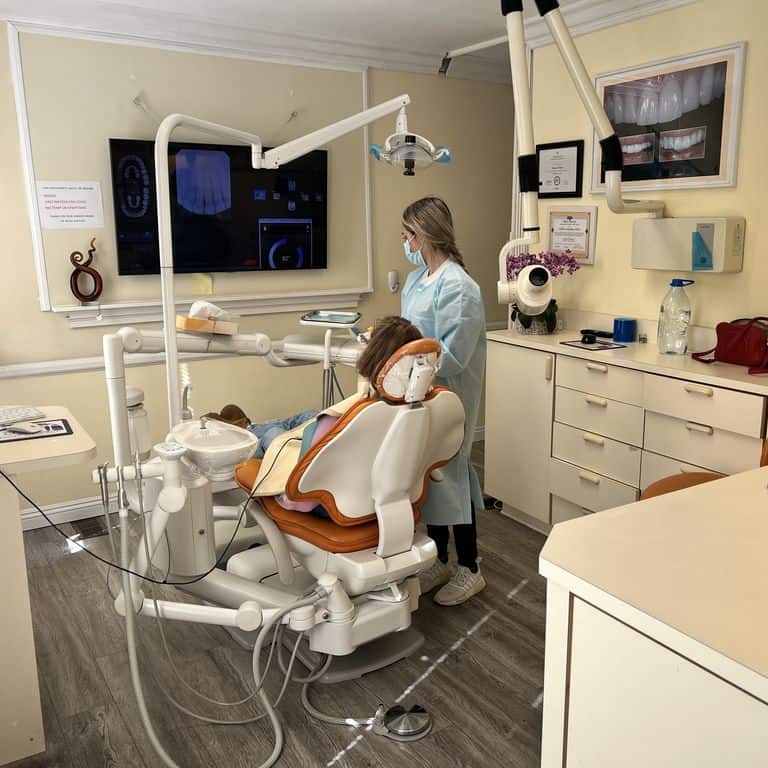
Implant Dentist in Los Angeles
Dr. Arthur Kezian, a reputed implant dentist in Los Angeles, is UCLA trained with over 1000s hours of implantology and continuing education courses. We have been attending to the needs of dental implant patients in and around Los Angeles for over 40 years. We are the first of its kind that specializes in handling all kind of dental implants. Call us or fill up the booking form now if you want us to extend help in any of the above mentioned dental implants which include Nobel, Straumann and Hiossen.

